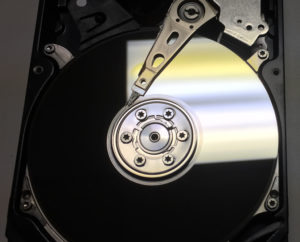 The hard drive spindle is a shaft that holds the platters in place. The platters are disks coated with a thin magnetic material — that magnetic material stores your data. Modern hard drives often have multiple platters, and part of the job of the spindle is to hold those platters in a fixed position relative to one another.
The hard drive spindle is a shaft that holds the platters in place. The platters are disks coated with a thin magnetic material — that magnetic material stores your data. Modern hard drives often have multiple platters, and part of the job of the spindle is to hold those platters in a fixed position relative to one another.
The spindle motor rotates the platters, allowing the actuator heads to read and write magnetic charges to the platters. A spindle failure occurs when the motor fails.
So, why does spindle failure happen and how can data recovery engineers treat this issue without risking permanent data loss? Here’s an overview.
Hard drive spindle motors need to rotate quickly and precisely.
To allow for an appropriate level of precision, older hard drives used roller bearings, small balls made of thermal-resistant materials such as zirconium dioxide and silicon nitride.
But roller bearings are extremely sensitive to contamination — if dust or other contaminants are present, the balls can’t rotate effectively. A common sign of spindle failure on an older drive is a whirring noise, which may be caused by the friction that occurs when the roller bearings seize.
Newer hard drives may use fluid bearings, which provide better stability (and therefore, better precision) at high rotational speeds. As hard drive capacity has increased, platter density has also increased, and fluid bearings allow for improvements in capacity and reliability.
Related: Hard Drive Data Recovery FAQ
Principles of Spindle Failure Data Recovery
If a hard drive’s spindle fails, the drive should be evaluated for platter damage, which may occur if the motor seizure causes the actuator heads to make direct contact with the platters.
Platter damage results in permanent data loss — if your hard drive shows any signs of physical damage, we strongly recommend turning off the power and seeking assistance from a professional data recovery provider.
Our engineers may use different methods to treat a hard drive spindle failure, largely dependent on the hard drive’s make, model, and spindle design. Typical recovery processes might include:
- Replacing the spindle with a spindle from a donor drive. The donor drive must be exactly matched to the recipient, and further repairs may be necessary if the spindle failure affected the position of the platters.
- Replacing contaminated fluid bearing assemblies or roller bearing assemblies.
- Swapping the platters to a donor drive. This can be a difficult process, since the exact position of the platters needs to be maintained during the recovery. Spindle replacement is often a better option.
All hard drive spindle repair procedures must be completed in a certified cleanroom. Otherwise, additional contamination may occur. Read about Datarecovery.com’s certified cleanrooms.
Prognosis for Hard Drives with Failed Spindles
Every physical hard drive failure is serious. However, the chances of a successful data recovery are high for hard drives with failed spindles, provided that the hard drive does not remain in operation after the failure.
If you believe that your drive has a failed spindle motor, take the following steps:
- Keep the drive powered off. Operating a failed hard drive may raise the chances of permanent data loss.
- Note any symptoms that preceded the failure. A failed spindle often causes unusual noises (such as whirring sounds), but in some cases, the hard drive may simply fail to “spin up.”
- Make a list of important files. Datarecovery.com provides a no data, no charge guarantee: If our engineers can’t recover your important files, you don’t pay for the attempt.
- Contact a professional data recovery provider. Spindle failures and other physical hard drive issues cannot be treated without appropriate equipment, so look for a provider with certified cleanrooms.
At Datarecovery.com, we’re dedicated to providing a dependable, professional resource for hard drive recovery. All of our locations are fully outfitted with certified cleanrooms, advanced proprietary data recovery tools, and the industry’s most comprehensive library of hard drive components. With decades of combined experience, our engineers can help you restore important data in a matter of days.
For all standard hard drive data recovery services, we offer free evaluations and our no data, no charge guarantee. To learn more or to start a case, call us today at 1.800.237.4200 or submit a case online.





